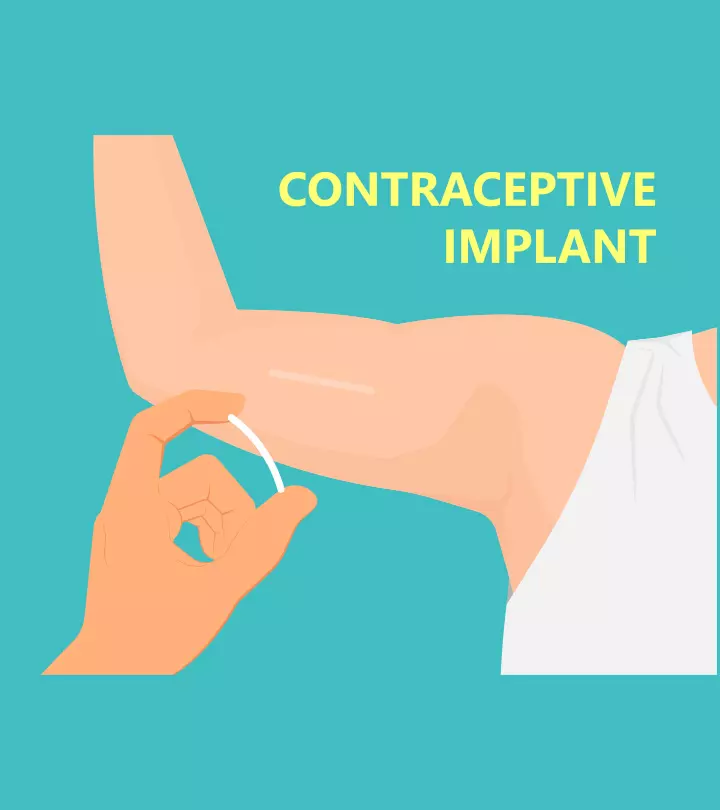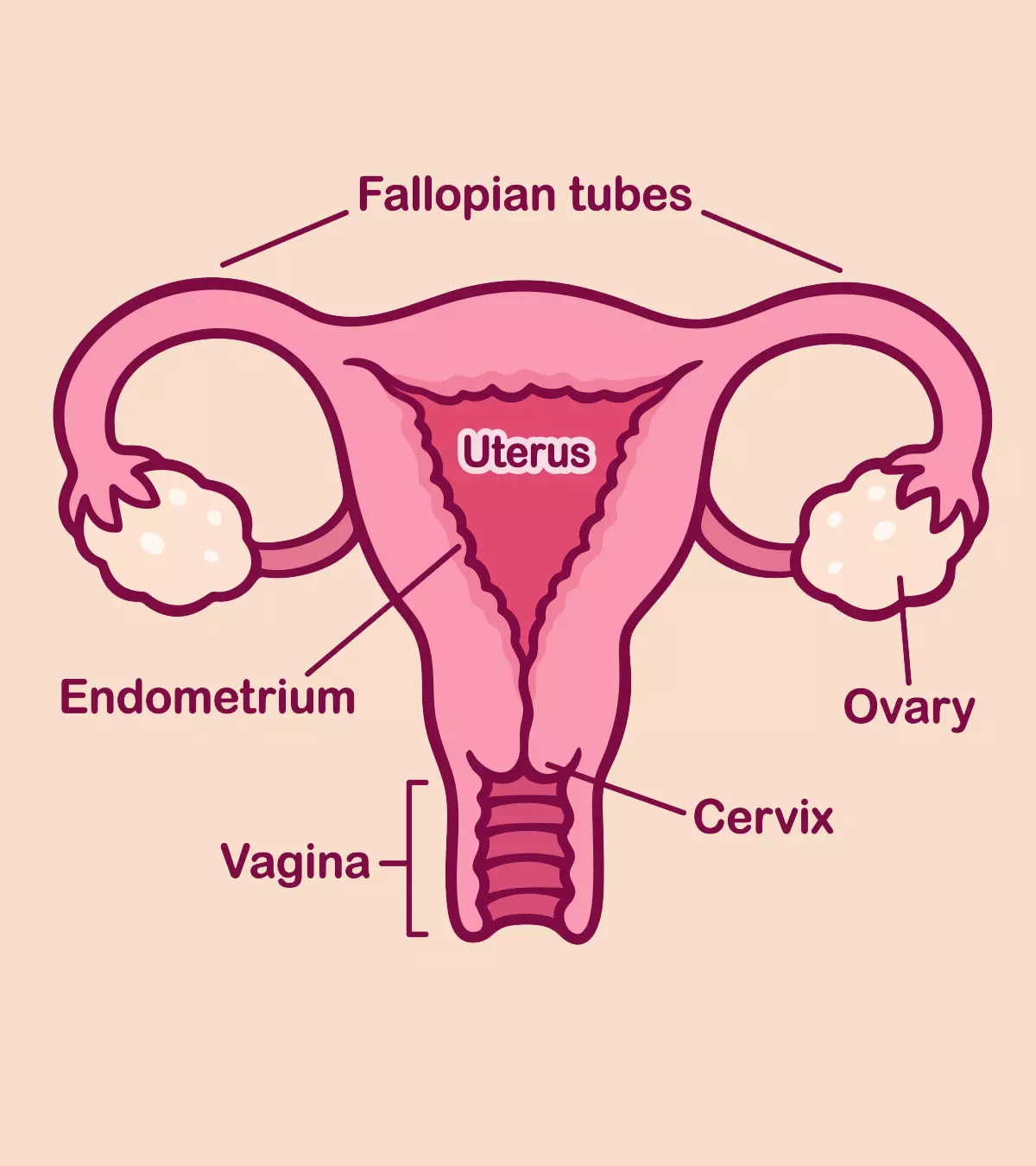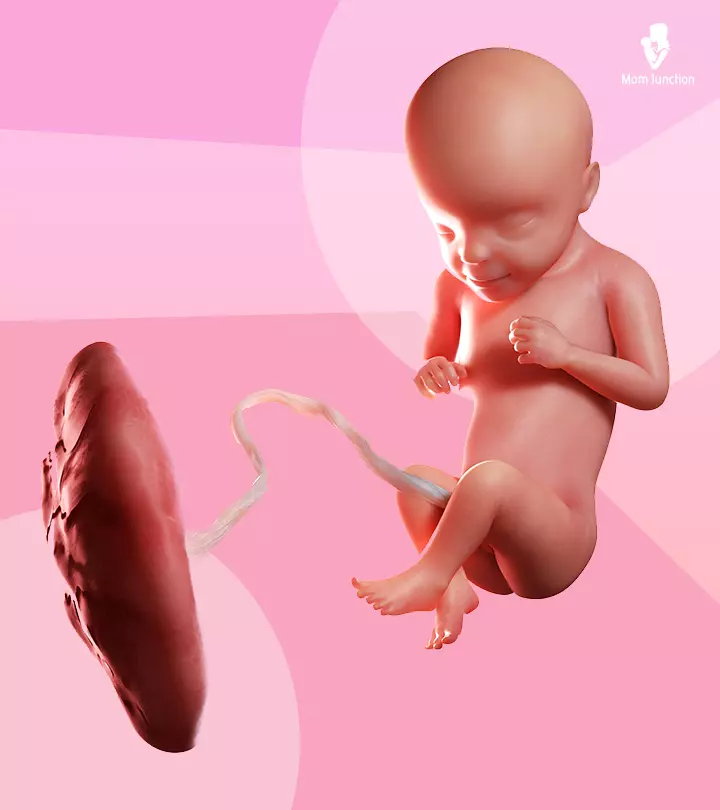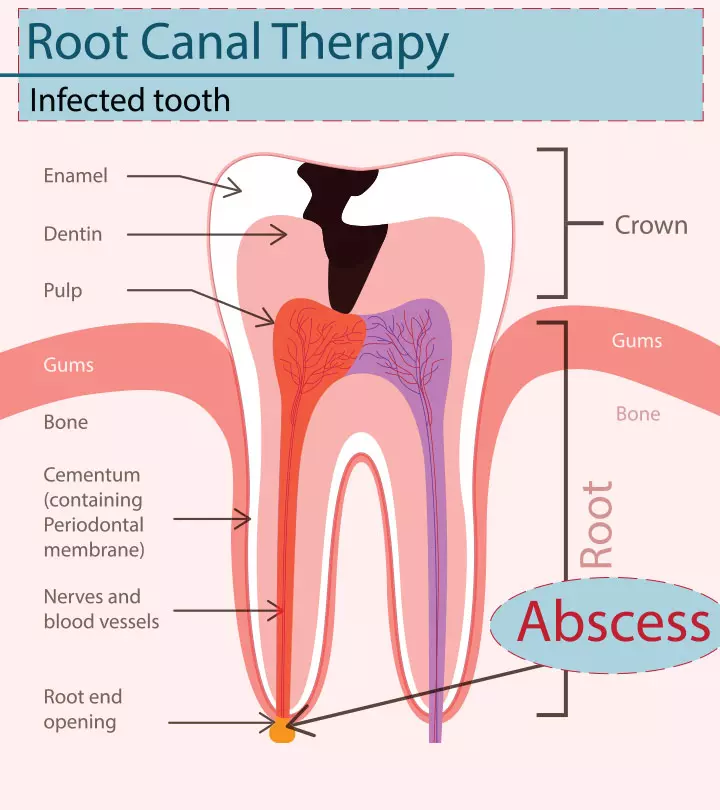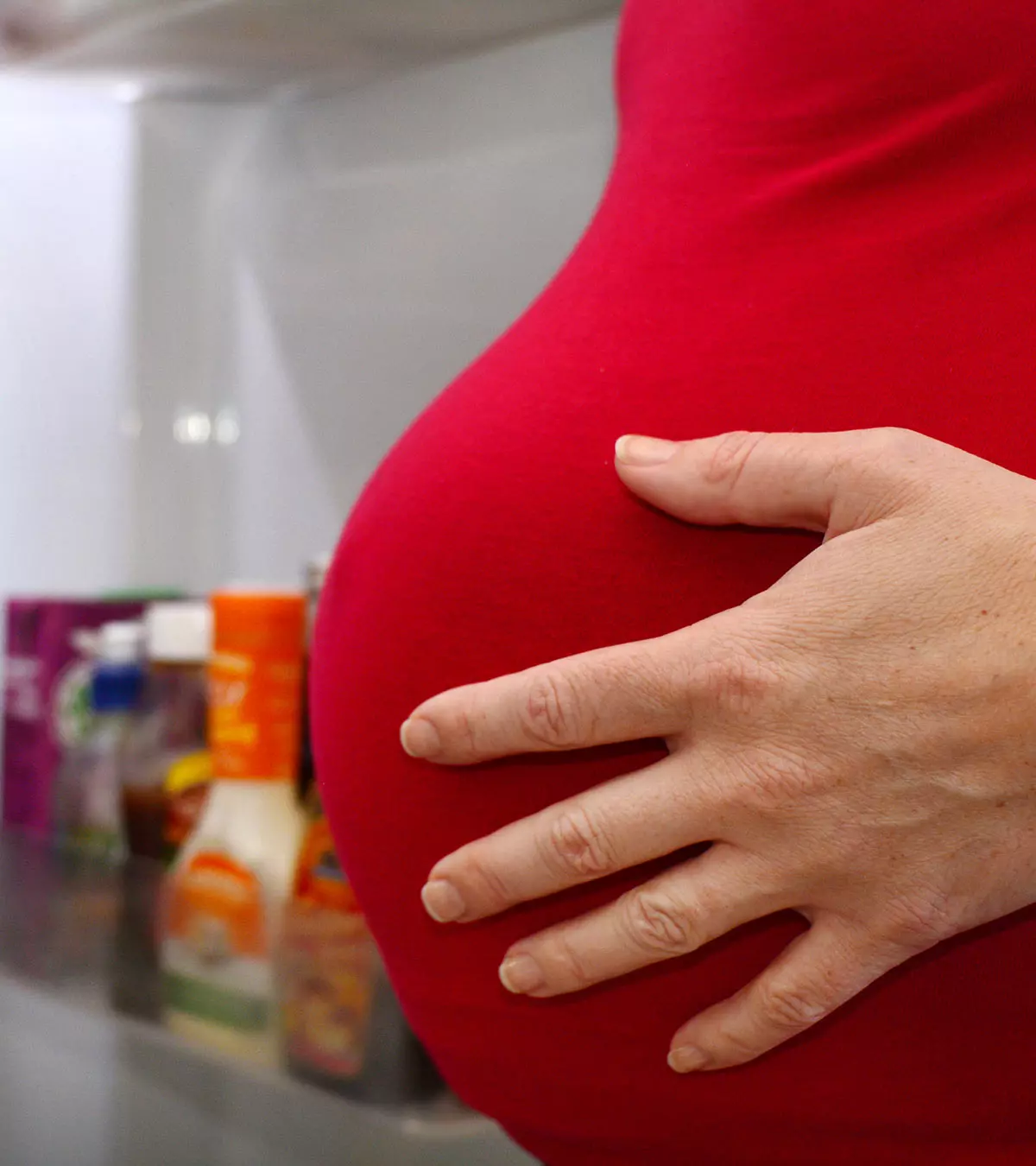
Image: Shutterstock
Hunger pangs during pregnancy are common. Many expecting moms feel hungry at odd hours or just a couple of hours after meals, primarily due to hormonal changes. However, they could also experience hunger pangs due to increased energy needs to support the growth and fetal development. If you are experiencing hunger pangs when pregnant, knowing the appropriate ways to deal with them can help you maintain a healthy diet. Keep reading to learn more about why pregnant women experience hunger pangs and how to deal with them without resulting in unwanted weight gain.

Key Pointers
- Hunger pangs are a common pregnancy symptom that should be addressed responsibly to prevent overeating.
- Managing hunger pangs can be achieved through regular consumption of calorie-dense foods and timely meals.
- Maintaining a healthy diet and staying hydrated is essential to feel fuller for longer periods.
- Unhealthy and high-calorie foods should be avoided to prevent unnecessary weight gain.
- If hunger pangs persist and cause extreme pain, medical attention should be sought promptly.
What Are Hunger Pangs?

Hunger pangs or hunger pain is an uncomfortable, gnawing feeling you have when your abdomen is empty. Hunger pangs are natural reactions to an empty stomach and are accompanied by a desire to eat. You may also experience these in the case of dehydration, sleep deprivation, or eating certain foods.
Can Hunger Pains Be A Sign Of Pregnancy?

Hunger pangs could be an early sign of pregnancy, as the hormonal levels change with conception. However, this cannot be a standalone symptom of pregnancy and should be seen in association with more significant symptoms, such as missing your period. A low blood sugar level may also cause intense hunger.
 Did you know?
Did you know?Is It Normal To Frequently Feel Hungry During Pregnancy?
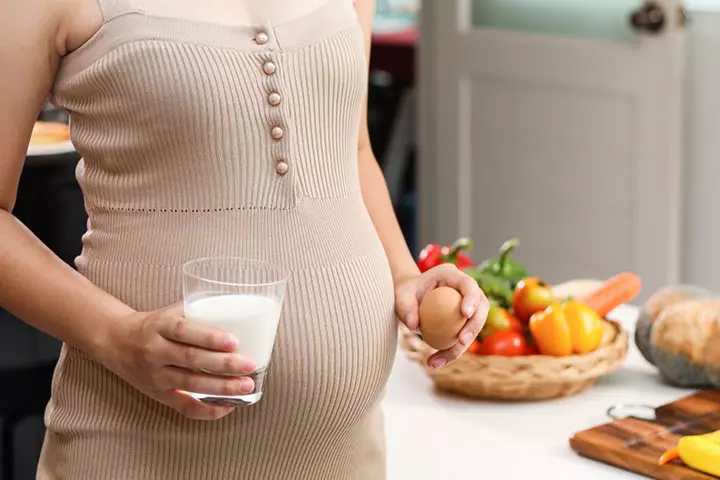
You are likely to feel hungry or have an increased appetite during pregnancy. In the first trimester, the hunger pangs could be due to morning sickness, as you tend to throw up often, and your stomach gets empty often. Some women lose their appetite due to nausea and may have food aversions or not feel hungry, especially in the first trimester.(1). Loss of appetite or hunger pangs in later pregnancy is also often associated with vomiting and nausea during pregnancy.
Obstetrician and gynecologist Dr. Veena Madhankumar says, “Hunger pangs during pregnancy can vary, usually appearing in the first trimester. This signals the body’s increased demand for nutrients to support the developing baby. Paying attention to these signals is essential, and adopting a routine of smaller, more frequent meals can help keep those hunger pangs at bay.”
From the second trimester, your growing fetus will need extra nutrients, which might increase the body’s need for prenatal nutrition and make you feel hungry often. Also, you need around 200 to 400 extra calories to meet fetal growth and nutrition needs during the second and third trimesters (2).
Studies have shown that the changes in estrogen and progesterone levels during pregnancy may affect the functioning of other hormones such as ghrelin, neuropeptide Y (NPY), and agouti-related protein (AgRP) that regulate food intake. Apart from this, resistance to α-melanocyte-stimulating hormone (α-MSH) may also cause hunger pangs during pregnancy. However, further human research is needed to establish the extent of the effect of these hormones (13).
 Be watchful
Be watchfulDealing With Hunger Pangs During Pregnancy
Do not overeat or binge when you are feeling hungry, as that could lead to unwanted weight gain. You may avoid that by eating right and managing your hunger pangs. Listed below are some general measures that are believed to work, and most people rely on them (14) (15).
- Include homemade soups and salads as they tend to be more nutritious and with fewer sugars and saturated fats. You may have homemade soups of vegetables and salads of fruits. Choose apple cider vinegar or virgin olive oil during pregnancy for preparing healthy salad dressing.
- Stay hydrated by drinking water. It not only beats your hunger but also keeps you satiated all through the day. Stick to water and avoid drinks that contain excess sugars and calories.
- Incorporate meal planning into your routine to create a healthy diet plan that includes whole-grain bread or brown rice for your daytime meals. Consuming fiber-rich foods during pregnancy could prevent indigestion and help manage constipation. High-fiber foods are also filling and might reduce hunger pangs. When snacking at midnight, opt for foods that are easy to digest to satisfy your cravings. Try herbal tea, toast with peanut butter, or a bowl of cereal with milk.
Mahima Satvik, a mom blogger, has some valuable advice on managing hunger pangs during pregnancy. She shares, “Hunger pangs struck me at the oddest hours. So, I always had a stash of healthy snacks — nuts, fruits, yogurt, and granola bars. Having them handy prevented me from reaching out for junk food (i).”
 Quick tip
Quick tip- Eating dry fruits and dates early in the morning might help reduce nausea, stomach discomfort and hunger pangs.
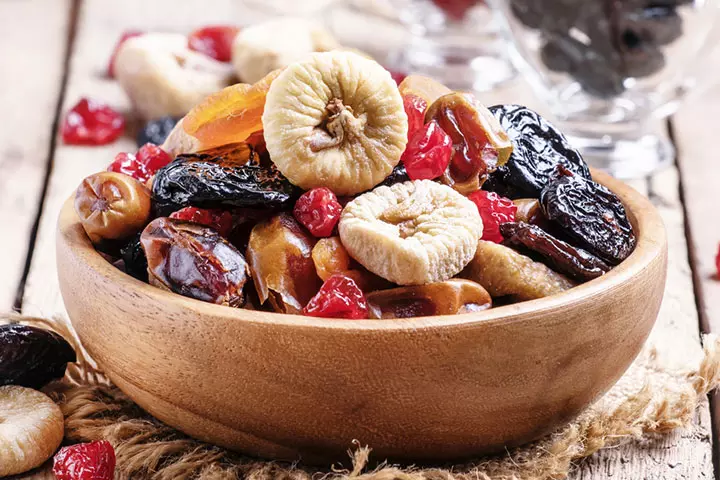
- Carry healthy snacks such as trail mix, biscuits, or fruit if you have to go for work or when away from home. This keeps you from purchasing outside food that might be unhealthy.
- Do not skip fats but choose the right types to satiate your hunger pains. Avoid saturated and hydrogenated fats found in packaged foods such as chips. You may include monounsaturatediDietary fats found in plant and animal-based foods and known to have positive health effects. and polyunsaturated fatsiDietary fats found in plant and animal-based foods beneficial for heart and human health. such as omega-3s. Good choices include olives, avocados, salmon, sardines, sunflower oil, soya oil, and flaxseed oil.
- Consuming cheese during pregnancy as a healthy and filling snack, especially when one is traveling, can be a great idea. Pairing cottage cheese with fruit is a satisfying way to meet the increased appetite during pregnancy (3).
- Consuming food rich in unsaturated fatsiHealth-benefiting liquid fats generally derived from animal and plants sources, and oils. such as groundnuts could keep you full for long.
- Chia pudding during pregnancy is a delicious snack that is ideal for managing sudden hunger pangs. It contains important Omega-3 fatty acids that benefit your health and your baby’s development (3).
- Edamame (young green soybeans) is another nutritious choice to curb hunger cravings. Edamame provides vital nutrients such as folic acid and calcium crucial for building strong bones and teeth in your growing baby (4).
- Eat slowly and chew longer. Your brain might take up to 20 minutes to feel full after eating. Therefore, you may tend to overeat and later feel full (5). Gastroenterologist Christine Lee, MD observes, “Chew thoroughly and swallow slowly. “Rushing can lead to aerophagia (swallowing air) and can cause abdominal bloating.”
- Eat frequently and split the meals to have several small meals instead of three large ones. The appearance of a full plate could make you feel hungrier than you are and make you eat more. As a trick, serve food in small plates.
- Lack of proper sleep during pregnancy may lead to emotional eating. Hence, Proper sleep is essential during pregnancy. But if hunger is disturbing your sleep and keeping you up in the middle of the night, eat tryptophan-rich foods that help regulate sleep. These foods stimulate the serotoniniA molecule secreted in the brain that transports messages from nerve cells throughout the body and is crucial for several bodily functions. and melatoniniA hormone produced in the brain in the darkness to induce sleep. levels in the body, thereby regulating your sleep-wake cycle. Banana, almonds, skimmed milk, whole-wheat bread, and oatmeal are examples of such foods you can have during pregnancy (6). Consult your doctor before eating tryptophan-rich food.

- Consuming a balanced diet is important for both maternal and fetal wellness in pregnancy. A diet with proper nutrients can help prevent several pregnancy-associated complications (7).
- If you have not gained the required weight in the first trimester, or have lost weight due to morning sickness, you might start having a food craving during pregnancy. So, check your pregnancy weight
Frequently Asked Questions
1. Will I be hungrier when pregnant with twins?
Yes. You may feel hungrier when pregnant with twins because you might need more calories to nourish your babies (8).
2. Does feeling hungry during pregnancy indicate the sex of the baby?
Research shows that your average energy intake increases by ten percent when carrying a boy. So, having a boy might make you hungry (9).
3. How do hunger pangs impact the baby’s health during pregnancy?
Hunger pangs, as such, have not been known to influence the baby’s health as long as the mother is getting adequate nourishment. However, if hunger pangs are ignored, and the mother does not eat sufficient food, it can lead to nutritional deficiencies. These deficiencies can affect the mother’s health and hamper the unborn baby’s proper growth and development.
4. Can hunger pangs during pregnancy affect my mental health?
When you are hungry, your blood sugar levels can drop, leading to feelings of anxiety, irritability, and even depression. Pregnancy itself can cause tiredness, and when combined with hunger pangs, it can trigger feelings of exhaustion, low motivation, and a sense of being overwhelmed. Therefore, pregnant women must take care of their mental state (10).
5. How can I get enough nutrients while managing hunger pangs?
Focus on incorporating a variety of food groups into your meals and snacks, including lean proteins, whole grains, healthy fats, and plenty of fruits and vegetables. Pre-planning your meals can also help you make healthier choices and avoid reaching for unhealthy snacks.
Hunger pangs during pregnancy can cause you to feel hungry more often than usual. Despite its frequency, do not be concerned since it is part of your pregnancy and seldom requires any medical intervention. Different trimester hunger pangs may be associated with various reasons. Your hunger may also increase as your pregnancy progresses to make up for the growing nutritional needs of the baby and yourself. You need to ensure that you eat nutritious foods and follow all the necessary measures while dealing with the hunger pangs during pregnancy.
Infographic: Dealing With Hunger Pangs During Pregnancy
An increased appetite, unusual cravings, and hormonal alterations could result in hunger pangs while pregnant. However, avoiding unhealthy or over-eating would help prevent diseases or unnecessary weight gain when expecting. This infographic details helpful tips on handling hunger pangs in pregnancy. Keep scrolling!
Some thing wrong with infographic shortcode. please verify shortcode syntax
Illustration: Ways To Deal With Hunger Pangs During Pregnancy
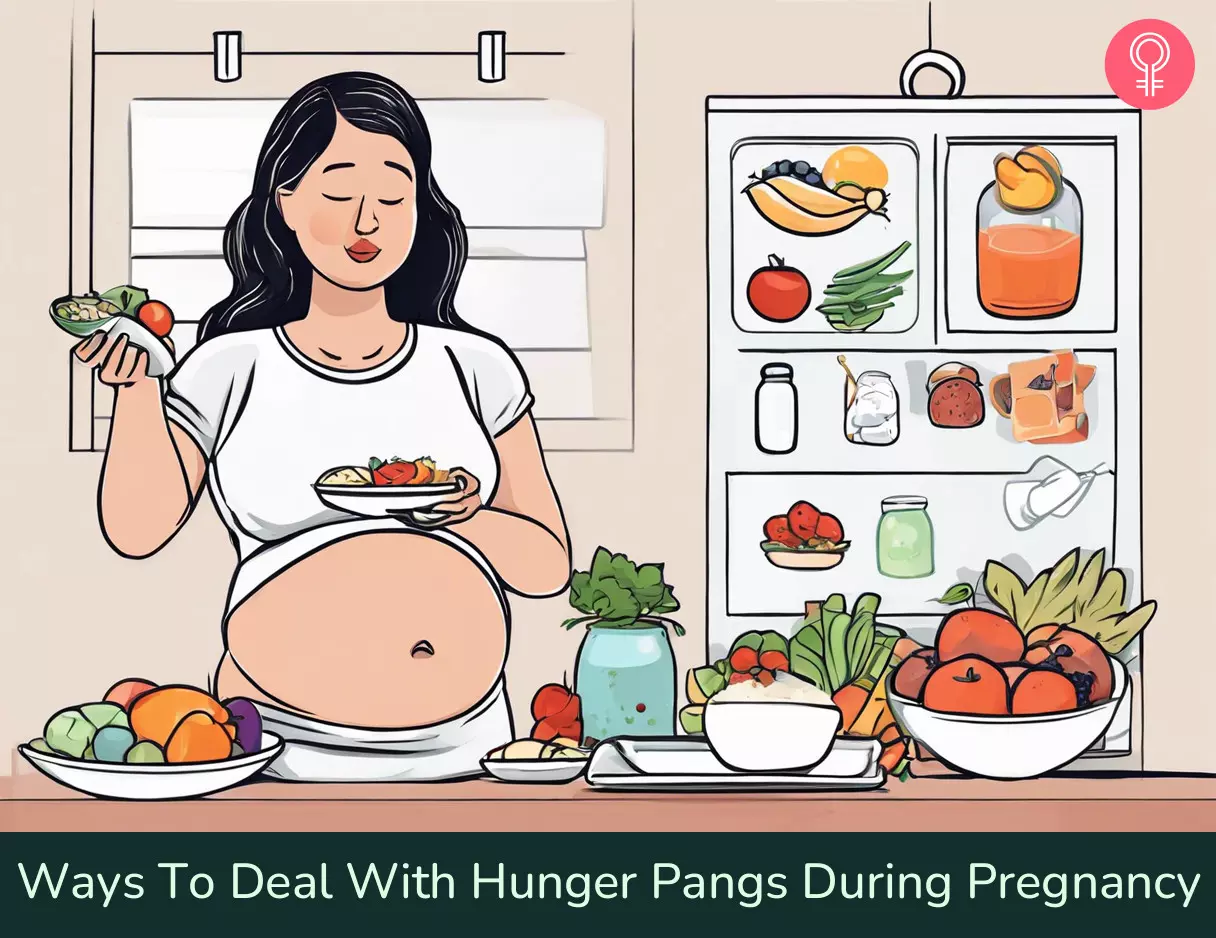
Image: Stable Diffusion/MomJunction Design Team
Explore and understand the reasons behind hunger pangs during pregnancy, ways by which you can manage it and whether or not to be concerned about it, in this video
Personal Experience: Source
MomJunction articles include first-hand experiences to provide you with better insights through real-life narratives. Here are the sources of personal accounts referenced in this article.
i. Embarking on the journey of motherhood: embracing a new routine;https://medium.com/@aditi16690/embarking-on-the-journey-of-motherhood-embracing-a-new-routine-697da567ed74
References
1. Hyperemesis gravidarum; NIH (2018)
2. Effect Of Obesity On Pregnancy; University of Utah
3. Pregnancy diet: Common myths and what you should eat during your pregnancy; UC Davis Health
4. Calcium; Harvard T.H. Chan School of Public Health
5. Ann MacDonald; Why eating slowly may help you feel full faster; Harvard Health Publishing (2010)
6. Mendel Friedman; Analysis, Nutrition, and Health Benefits of Tryptophan; US National Library of Medicine
7. Stress During Pregnancy; American Pregnancy Association
8. BEING PREGNANT WITH TWINS, TRIPLETS AND OTHER MULTIPLES; March of Dimes
9. Rulla M Tamimi et al.; Average energy intake among pregnant women carrying a boy compared with a girl; NCBI; (2003)
10. Depression in pregnancy; National Health Service
11. Rachael A Augustine et al.; From feeding one to feeding many: hormone-induced changes in bodyweight homeostasis during pregnancy; NCBI; (2008)
12. Gestational Diabetes: What You Need to Know; Cedars Sinai
13. Marijke M Faas et al.; A Brief Review on How Pregnancy and Sex Hormones Interfere with Taste and Food Intake; NCBI; (2009)
14. Cravings; The President and Fellows of Harvard College
15. Why Do I Get Hunger Pangs?; Cleveland Clinic
Community Experiences
Join the conversation and become a part of our nurturing community! Share your stories, experiences, and insights to connect with fellow parents.
Read full bio of Dr Ankita Gharge

Dr. Veena Madhankumar is an experienced obstetrician and gynecologist with 25 years of clinical expertise. She completed her MBBS from Coimbatore Medical College, India, in 1999 and pursued her MD in Obstetrics and Gynecology from Sri Ramachandra Medical College, Chennai, India. Dr. Madhankumar has been associated with iCliniq for over a decade, providing expert medical consultations and guidance. She has also established a practical laparoscopy training course.
Dr. Veena Madhankumar is an experienced obstetrician and gynecologist with 25 years of clinical expertise. She completed her MBBS from Coimbatore Medical College, India, in 1999 and pursued her MD in Obstetrics and Gynecology from Sri Ramachandra Medical College, Chennai, India. Dr. Madhankumar has been associated with iCliniq for over a decade, providing expert medical consultations and guidance. She has also established a practical laparoscopy training course.
Read full bio of Swati Patwal
Read full bio of Rebecca Malachi
Read full bio of Aneesha Amonz







